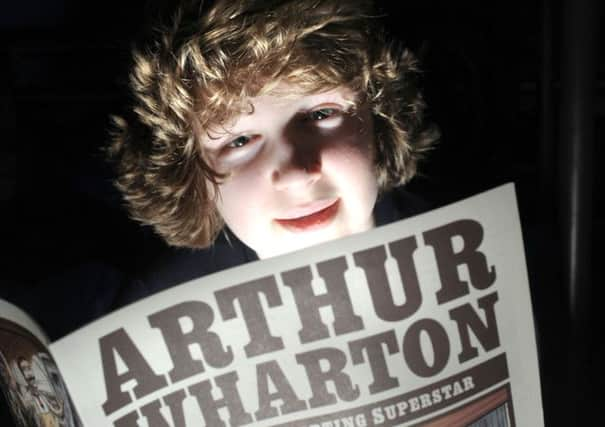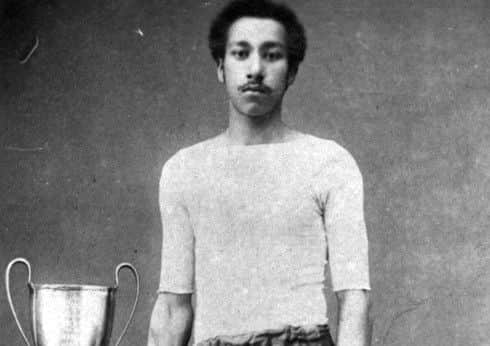Club set to remember world’s first black footballer


But now Arthur Wharton’s place in history is being celebrated on the 125th anniversary of him becoming the world’s first black professional footballer.
It was as a goalkeeper for Rotherham Town in 1889 that he is believed to have been the first black man to be paid to play the game.
Advertisement
Hide AdAdvertisement
Hide AdIn his early career as an athlete he was also the world’s fastest man, won a national sprint title and became the first person to record a time of ten seconds flat in a 100 yard race.


He died in the 1930s and for more than 60 years lay in an unmarked grave in Edlington, where he had worked as a miner in later life. Now campaigners are determined to make 2014 “Arthur’s Year”.
Plans were announced yesterday to erect a statue of him outside Rotherham United’s football stadium while a Yorkshire charity is helping to bring his story to a whole new generation through a package of materials for schools including a new comic book.
Renowned Yorkshire sculptor Graham Ibbeson is to create the bronze statue of Wharton with three figures merged into one, showing a goalkeeper leaping to save a steel football.
Advertisement
Hide AdAdvertisement
Hide AdThe 17ft high sculpture will be placed outside Rotherham United’s New York Stadium.
The plan was formally launched at the ground at an event attended by Wharton’s granddaughter Sheila Leeson great granddaughter Dorothy Rooney who both still live in South Yorkshire.
The plan for the statue is being led by Jim Cadman and backed by both the club and Rotherham Council. Fund raising will now take place to help pay for it.
Mr Cadman said: “This year we celebrate the 125th anniversary for football when Arthur Wharton signed for Rotherham to become the world’s first black professional footballer.
Advertisement
Hide AdAdvertisement
Hide Ad“Along with Graham, I decided that we should mark such an occasion and it seemed only fitting that the tribute be in Rotherham itself, particularly as his family still live in the area.”
Mr Ibbeson, from Barnsley, said: “I have done many famous sculptures but this one seems to have an added significance. He was the first black professional footballer and it happened here in Yorkshire. It is something we can be proud of – he is a real sporting hero. I think he was the first ‘Roy of the Rovers’.”
Now thanks to the work of the Sheffield-based charity Football Unites Racism Divides (FURD) he has been turned into a comic book hero. Arthur Wharton: Victorian Sporting Superstar is part of a package of material the charity has produced for schools which can be found at a new website – www.arthurwharton.info .
FURD has been involved with Mr Wharton’s story since the charity was created in 1996.
Advertisement
Hide AdAdvertisement
Hide AdIt raised funds to place a headstone on his unmarked grave in 1997 and has worked to promote his story ever since.
The comic book retells Wharton’s story through the eyesof his granddaughter Sheila Leeson who charts his life from being born in what is now Ghana to coming to England to train as a methodist missionary.
His sporting prowess sees him win a series of sprinting titles before his football career is launched by Darlington.
Howard Holmes, from FURD, said: “2014 will undoubtedly be Arthur’s Year, the time when his amazing story will reach millions of people in the UK alone.
Advertisement
Hide AdAdvertisement
Hide Ad“A number of celebratory events are planned, including separate statues of the great pioneer.”
In 1886 Wharton signed for Preston North End, one of the biggest sides in the country at the time, as they needed a top amateur goalkeeper to play for them in the FA Cup.
He was part of the team which reached the semi-finals. He was playing for the club during its “invincibles season” when they went a year undefeated – a feat not matched until 105 years later by Arsenal in 2004.
He left the club to focus on sprinting but it was when he returned to the game at the now defunct Rotherham Town that he became the first ever black professional footballer. He played for Rotherham for five years before joining Sheffield United where he became the first black man to play in the top flight of English football. Mr Holmes said: “He was a pioneer. There would not be another black professional for 20 years. The fact that there was black presence at the very beginning of the professional game is such an important message to give people.”